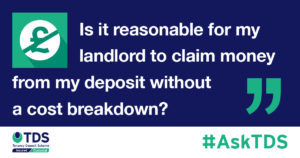The Tenancy Deposit Scheme (TDS) is a government approved scheme for the protection of tenancy deposits; we offer both insured and custodial protection. We also provide impartial adjudication for disputes that arise over the tenancy deposits that we protect. This article has been written in response to a tenant’s query: “Is it reasonable for my landlord to claim money from my deposit without a cost breakdown?”
At the end of a tenancy most tenants are understandably keen to have their deposit returned to them – promptly and in full. Sometimes though, there are costs that need to be recovered and negotiations over these costs can drag on. This is where tenants can turn to alternative dispute resolution (ADR) a service offered by all tenancy deposit schemes.
 How long do I need to wait for my landlord to tell me what costs they want to claim for from my deposit?
How long do I need to wait for my landlord to tell me what costs they want to claim for from my deposit?
Your landlord or agent should return the deposit within 10 calendar days of you requesting it.
If you do not receive your deposit within this time frame, talk to your landlord or letting agent in the first instance to establish if the delay is due to deductions being made.
While it would be considerate of the landlord to respond as quickly as possible, tenants should try to understand that it may not be easy for the landlord to do so. At TDS we regularly advocate open communications between landlord and tenant – allowing the relationship to sour into an ‘Us VS Them’ mentality causes more harm than good with both sides becoming less likely to budge in negotiations.

With this being said, if you feel that your landlord, or agent acting on the landlord’s behalf, is dragging out the process you can reach out to the scheme protecting your deposit and raise a dispute yourself. TDS prides ourselves on our excellent customer service and we work to ensure that our adjudication process is as smooth and as expedited as it can be without sacrificing on quality of service.
The landlord has put in a claim for £200 for damage but I left the property in excellent condition – can I ask them to be more specific?
If you don’t think that the claim is reasonable you are of course within your rights to question the claim. The first port of call should be to ask for a breakdown of how they have come to this figure, and if this is not clear in the initial claim – an explanation of where the damage is said to have occurred.
It would be good for you to have a copy of both the check-in and check-out report for comparison, so that you can evidence any change in condition of the property. If you cannot find mention of any significant change then highlight this to the landlord/agent when you ask for further clarification.
 My landlord has claimed for cleaning costs but when I asked for a receipt they couldn’t provide one – is this reasonable?
My landlord has claimed for cleaning costs but when I asked for a receipt they couldn’t provide one – is this reasonable?
Claims from the deposit are to compensate the landlord for a loss. For example if you broke the refrigerator in the property the landlord could claim some money towards the cost of replacing this, however as this sum is a compensatory amount, the landlord is not required to spend the money on replacing the broken item. We covered this topic in a similar blog about redecoration costs.
Therefore the landlord can charge you with an estimated cost for cleaning without needing to provide an invoice, as they are not obliged to spend that money on having the property cleaned.
 Why are they claiming money from my deposit when the property has been sold?
Why are they claiming money from my deposit when the property has been sold?
As above, the deduction from the deposit money is a compensatory amount. They may have sold the property but if the property was perceived to be a lower value due to damage or being in need of redecoration due to your occupation during the tenancy then they may have had to sell the property for a lower amount. While they cannot use the money they are claiming from your deposit to rectify the damage, they can use it to compensate themselves for the loss in value.
It is easy to look at deductions and expect an exact cost to be matched to a receipt or fee, however, the money a landlord claims is compensatory and doesn’t need to be spent on the property. While deductions should be made in a timely manner, tenants should begin by opening discussion rather than immediately beginning a dispute.
Other news stories


